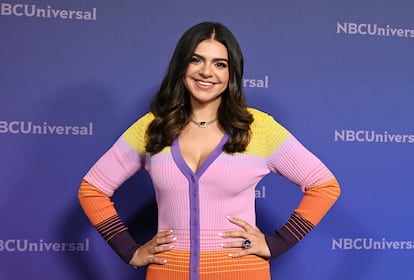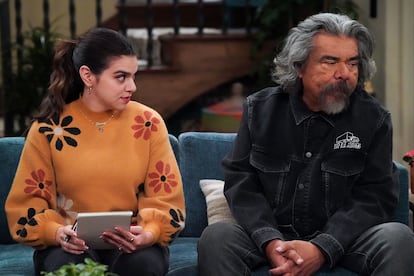Mayan Lopez, the actress who healed her paternal wounds in front of a live studio audience
The Mexican-Cuban comedian gets laughs out of trauma, fragile masculinity and the importance of going to therapy in the series ‘Lopez vs Lopez,’ now into its third season

In the hands of Mayan Lopez, TikTok became a tool for healing. She had been estranged from her father, the famous actor and comedian George Lopez, for around a decade following his acrimonious divorce from her mother, Ann Serrano. But four years ago, when the Covid pandemic hit, both daughter and ex-wife became concerned about George, who has a compromised immunological system. His health condition unexpectedly brought the family together again, a story that Mayan couldn’t help but share on social media.
On one occasion, Mayan even came to the defense of George on TikTok when a video was posted telling of her father’s infidelity, which took place after Serrano donated her kidney when he need a transplant to replace his own. Mayan, who was 24 at the time, responded to that publication by posting herself twerking upside-down against a wall. Later, she began to post a series of videos about how her parents, despite being separated, continued to act as though they were married. The content was a product of her frustrations, doubts, and happiness that stemmed from emotions regarding her parents. Producer Debby Wolfe saw her clips, and in them, a family dynamic between Mayan and George that Wolfe thought would make a good series.
“I immediately thought: ‘This is a show.’ This Gen Z Latina, unafraid to call out her boomer father for bad parenting. Raw and hilarious,” Wolfe told Variety. Thusly, two years ago, the idea for Lopez vs Lopez was born. The resulting series approaches themes of trauma, fragile masculinity, and the importance of going to therapy, using both humor and drama to do so.
At the start of the series, George and Mayan (who play fictional versions of themselves in a plot inspired by their real-life relationship), reunite and attempt to heal their deep rift after a long estrangement. George has a history of being a less-than-trustworthy spouse and father who abandoned his family until he needed a place to stay. Mayan, the mother of a son named Chance (Brice Gonzalez), has self-diagnosed daddy issues that prevent her from trusting and taking the next step with her boyfriend, the father of Chance, Quinten Van Bryan (Matt Shively). They are all in the process of trying to forgive each other.

Trauma-healing humor
By touching on real subjects, dynamics and family relationships, the series’ first season attracted an average of 4.7 million viewers across all platforms, doing its highest numbers in Hispanic households where English is primarily spoken.
Mayan — who has Mexican heritage from her father and Cuban from her mother — was born in San Fernando, California. She’s now 28. Throughout the series’ three seasons, she’s wielded humor to work through trauma, and continues to engage with subjects that trouble her, issues and concerns that might have been taboo for previous generations and that form part of the distinct Latino identity.
“I think that the stories we find most captivating, the ones that I connect with, are based on the truth and will always be identifiable, because I think there are things that you can’t write, that you simply have to experience,” says Mayan in a video call interview.
Their father-daughter tag team has managed to relive and revisit their most painful moments — many times, in front of a live studio audience. It hasn’t been easy, Mayan says, but it helped that during the pandemic, they attended therapy together to heal the traumas they’d both accrued. George was raised by his grandfather after being abandoned by his own father when George was just three months old, an experience he mined for his U.S. stand-up comedy specials in the early years of his career.
Mayan, who studied at the Second City Conservatory Program and the Columbia College Acting and Contemporary Performance Program in Chicago, followed a similar path to that of her dad — and she found she didn’t want to do it without him. “When we began the program, we took a chance on each other. We were brave. I think that’s the love we felt when we reconnected. I could have chosen not to reconnect with my father, but I couldn’t imagine my life without him, and can safely say he feels the same way about me,” she says.
The young comedian, who also works as a screenwriter on Lopez vs Lopez, thinks that representing their Latino community is an important aspect of the series. She’s also driven by the need to approach certain subjects that are as relevant today as they were during the time of her great-great-grandparents, from a modern point of view. She sees the opportunity to make the third season of a series that reaches millions of people living in the United States as “very important.” “Latinos are not being 100% considered. Many shows about us are canceled after one or two seasons. I think it’s important to showcase us, because I don’t think anyone can tell our stories better than we can,” she says.
Lopez’s mother is a first-generation Cuban immigrant whose family looked to assimilate into life in the United States, a process that left them unable to “express their emotions” after so much pursuit of the American dream. Their travails have made their way onto the show, which approaches issues of masculinity, its fragility, machismo in the domestic space and the perceived need to hide one’s feelings with the goal of flipping the narrative of Latino cliches.
“Vulnerability is thought of as weakness, but I think in reality, it is strength. Speaking to men from the Latino community who suffer because no one ever taught them to express their feelings is something we can do frankly and openly through the George character, so that the same audience can realize they can aspire to that as well,” she says.
Representation in Hollywood
Mayan, who grew up on her father’s tours and on the set of The George Lopez Show — a series whose six seasons aired from 2002 to 2017 — has seen the panorama for Latinos in the film and television industry change over the last two decades. She remembers how hard her dad, whose career has lasted 40 years and who was selected as one of Time’s Latino Leaders of 2024, worked to open doors to his peers and shake free from stereotypical roles.
“I saw how he turned down roles because they weren’t positive for Latinos. Representation has improved and it’s more positive. Now you can see us in normal jobs and we’re not always playing characters who have accents. My dad was in Blue Beetle, the first movie adaptation of DC’s first Latino superhero. We also saw Marvel’s Black Panther, and knew that we were starting to make progress. I like the direction we’re headed in,” says Lopez.
Deep into work on Lopez vs Lopez, Mayan knows that she hasn’t been dedicating the same amount of time to TikTok as she did in the past. “I still love TikTok. We’re the first show that came out of the platform, so I should give a little more love and appreciation to my roots,” she says with a laugh. Ambitious and brimming with ideas, she doesn’t want to put any limits on her career. She sees herself continuing to produce for the Latino community, and would love to work as a host and presenter. One of her dreams is to collaborate with Eva Longoria and Salma Hayek, and to follow their footsteps into directing. “I hope to do it all, this is just the beginning,” she says.
Sign up for our weekly newsletter to get more English-language news coverage from EL PAÍS USA Edition
Tu suscripción se está usando en otro dispositivo
¿Quieres añadir otro usuario a tu suscripción?
Si continúas leyendo en este dispositivo, no se podrá leer en el otro.
FlechaTu suscripción se está usando en otro dispositivo y solo puedes acceder a EL PAÍS desde un dispositivo a la vez.
Si quieres compartir tu cuenta, cambia tu suscripción a la modalidad Premium, así podrás añadir otro usuario. Cada uno accederá con su propia cuenta de email, lo que os permitirá personalizar vuestra experiencia en EL PAÍS.
¿Tienes una suscripción de empresa? Accede aquí para contratar más cuentas.
En el caso de no saber quién está usando tu cuenta, te recomendamos cambiar tu contraseña aquí.
Si decides continuar compartiendo tu cuenta, este mensaje se mostrará en tu dispositivo y en el de la otra persona que está usando tu cuenta de forma indefinida, afectando a tu experiencia de lectura. Puedes consultar aquí los términos y condiciones de la suscripción digital.









































